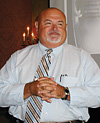
Woody Woodall of W.E. Bowers pointed out that in order to provide consistently satisfied customers, employees need to be empowered to solve their problems independently.
What that indifference means is that your company did not meet the customer’s expectations. It’s not totally fouled up; those dissatisfied customers tend to tell 9-15 others about their experience, Woodall said. But you didn’t really exceed either. Those customers tell 3-5 others about their good experience.
According to Woodall, 96 percent of disappointed customers don’t complain. And they certainly don’t brag on you.
“We can’t afford to be average anymore,” Woodall said. Customers need to be actively moved from being indifferent, to being highly satisfied.
PROBLEM SOLVING
Woodall pointed out something top contractors already know: in order to provide consistently satisfied customers, employees need to be empowered to solve their problems satisfactorily.“If you resolve the issue on the spot, 95 percent will work with you again,” he said. “Have we enabled our people to resolve those problems?” Resolving service problems can be even more appreciative than those customers whose problems were resolved correctly the first time. “Customers with resolved problems are more loyal than those who never had a problem,” Woodall said.
The key to superior service is employee empowerment and communication. Give them the power to make things right, and give them permission to strive for excellence as employees.
“Do our field hands know we are value-driven contractors?” asked Woodall. “Have we shared that information with the team? Sometimes we zoom by these little things.”
When it comes to finding extra work, one attendee said that his company provides a 1 percent spiff on new work after employees take an ethics course. “Sometimes a little incentive works,” acknowledged Woodall. He also recommended not scheduling any preventive maintenance contract work on Fridays, only repairs. Others advised that all techs take a full set of readings on all jobs.
The main thing is for employees to take ownership in what they’re doing, and then make the customer aware of what they are doing.
BOWERS SPOTLIGHT
The meeting then pointed to W.E. Bowers as an outstanding example of customer service through employee empowerment. This GreenSTAR contractor started up in 1984, starting in telecomm service and moving into construction. Its work now includes mission-critical data centers. A prefab facility was opened recently to facilitate fast-track work.In a Bowers-exclusive roundtable, Pat Curley said the customer service atmosphere in the company “starts at the top; there’s a lot of loyalty.” In high-pressure situations, Curley said, you have to be able to relax and laugh, as well as jump in and help. The contractor provides regular stress relief.
Bridgette, the office-service manager, commented that the new prefab shop has increased on safety and saved on tools, labor, and more.
With 525 employees and $180 million revenue, the contractor has 1,535 locations under contract now. Robert Johnson, sales accountant, sells service contracts and works with the service department. “Everybody is a team player,” he said. “I really enjoy coming to work every day.”
Woodall said there are a series of cheers that seem to occur spontaneously in the office ... and yodeling (which he declined to demonstrate). “We allow people the flexibility to make mistakes,” he said. “We allow them to learn.”
Publication date:10/26/2009

Report Abusive Comment